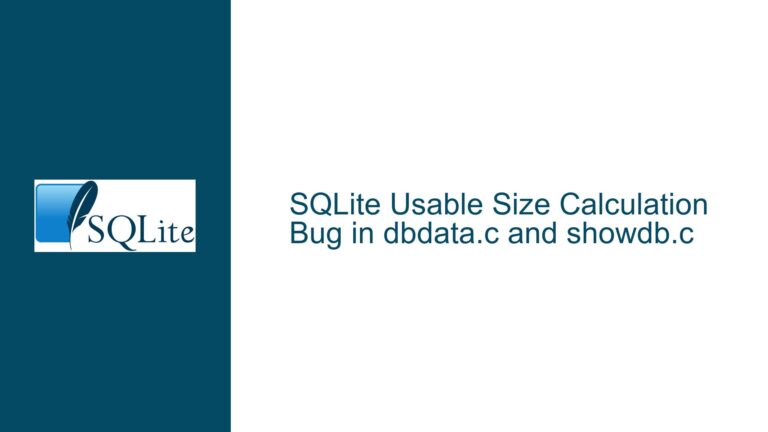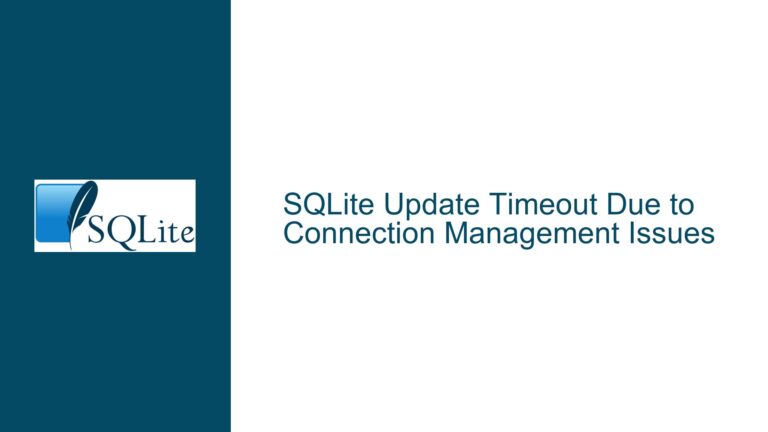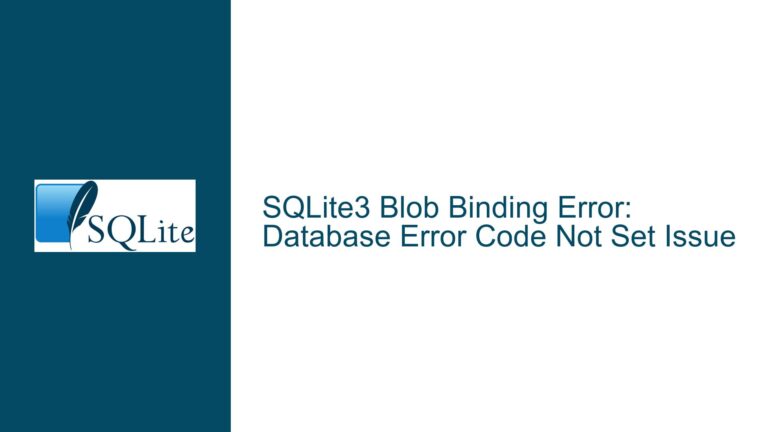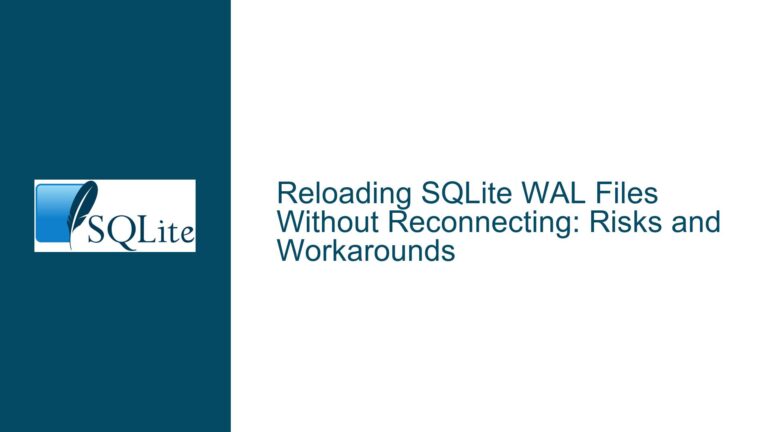SQLite Extension Loading Issues and Troubleshooting Guide
Issue Overview: Loading SQLite Extensions and Unexpected Behavior in SQLite 3.41
The core issue revolves around the loading of SQLite extensions, specifically the define extension, which allows users to define custom scalar functions dynamically. The problem manifests in two primary ways:
Extension Loading Failures: Users encounter errors when attempting to load the
defineextension using theload_extension()SQL function. The error messages vary, including "error during initialization" and "The specified module could not be found." These errors occur even when the extension file exists and is accessible.Behavioral Changes in SQLite 3.41: A significant change in behavior was observed in SQLite version 3.41 when using the
load_extension()SQL function. Unlike previous versions, SQLite 3.41 returns a named column (the SQL statement itself) when the extension is successfully loaded, which can be misinterpreted as a failure. This change in output format is undocumented and has led to confusion, as users may attempt to reload the extension, resulting in errors due to the extension already being loaded.
Possible Causes: Why Extension Loading Fails or Behaves Unexpectedly
Extension Already Loaded: One of the most common causes of failure is attempting to load an extension that is already loaded. SQLite does not allow redefining functions or reloading extensions while a Virtual Machine (VM) is active on the connection. This can lead to runtime errors, especially when users mistakenly believe the initial load failed due to the new output format in SQLite 3.41.
Incorrect File Path or Extension Name: The
load_extension()function requires the correct file path and extension name. On Windows, the.DLLextension must be omitted when using the SQL function, as it is automatically appended. Providing the full path with the.DLLextension can result in the "The specified module could not be found" error.SQL Function Disabled: The
load_extension()SQL function may be disabled by default for security reasons. Users must explicitly enable it using the.dbconfig load_extension oncommand in the SQLite CLI. If this setting is not enabled, attempts to load extensions will fail.Operating System Differences: The behavior of extension loading can vary between operating systems. For example, Windows handles dynamic link libraries (DLLs) differently from how Linux handles shared objects (
.sofiles). These differences can affect how extensions are loaded and initialized.Changes in SQLite 3.41: The introduction of a named column in the output of the
load_extension()function in SQLite 3.41 has caused confusion. This change, while seemingly minor, has led users to misinterpret successful loads as failures, prompting them to reload the extension and encounter errors.
Troubleshooting Steps, Solutions & Fixes: Resolving Extension Loading Issues
Step 1: Verify Extension Loading Status
Before attempting to load an extension, check if it is already loaded. Use the following query to list all loaded functions:
SELECT name FROM pragma_function_list WHERE name LIKE '%scalar%';
If the functions DefineScalar, UndefineScalar, or CopyScalarFunctions appear in the results, the extension is already loaded, and attempting to reload it will cause an error.
Step 2: Use the Correct Syntax for Loading Extensions
When using the load_extension() SQL function, ensure the file path is correct and omit the .DLL extension on Windows. For example:
SELECT load_extension('D:/SQLite32/Extensions/DEFINE');
Alternatively, use the .load command in the SQLite CLI, which does not require omitting the .DLL extension:
.load 'D:/SQLite32/Extensions/DEFINE.DLL'
Step 3: Enable the SQL Load Extension Function
If the load_extension() SQL function is disabled, enable it using the following command in the SQLite CLI:
.dbconfig load_extension on
Verify the setting with:
.dbconfig load_extension
Ensure the output shows on.
Step 4: Handle SQLite 3.41 Output Changes
In SQLite 3.41, the load_extension() function returns a named column (the SQL statement) when the extension is successfully loaded. To avoid confusion, use the ifnull() function to provide a clear success message:
SELECT ifnull(load_extension('D:/SQLite32/Extensions/DEFINE'), 'Loaded') AS Extension;
This will return Loaded if the extension is successfully loaded, making the output unambiguous.
Step 5: Debug Initialization Errors
If you encounter "error during initialization," ensure that no active statements are running on the connection when loading the extension. Exit the CLI and start a fresh session before attempting to load the extension again. Additionally, verify that the extension file is not corrupted and is compatible with your SQLite version.
Step 6: Recompile the Extension
If the extension fails to load, recompile it from the source code. Ensure that the compilation environment matches the target system (e.g., 32-bit vs. 64-bit). For Windows, use the following commands to compile the define extension:
make prepare-dist
make download-sqlite
make download-external
make compile-windows
Step 7: Check for Operating System-Specific Issues
On Windows, ensure that the DLL is not blocked by security software (e.g., Norton). Add the extension file to the exclusion list of your antivirus software. On Linux, ensure that the shared object file has the correct permissions and is located in a directory included in the library path.
Step 8: Enumerate Loaded Extensions
While SQLite does not provide a direct way to enumerate loaded extensions, you can infer their status by checking for functions or modules they provide. For example, after loading the define extension, check for the presence of the DefineScalar function:
SELECT name FROM pragma_function_list WHERE name = 'DefineScalar';
If the function is listed, the extension is loaded.
Step 9: Report Bugs and Provide Feedback
If you believe you have encountered a bug in SQLite, such as the undocumented output change in version 3.41, report it to the SQLite development team. Include detailed steps to reproduce the issue and any relevant error messages. This helps improve future releases and ensures that documentation is updated to reflect behavioral changes.
By following these troubleshooting steps, users can resolve common issues related to loading SQLite extensions and adapt to changes in SQLite’s behavior across different versions.






